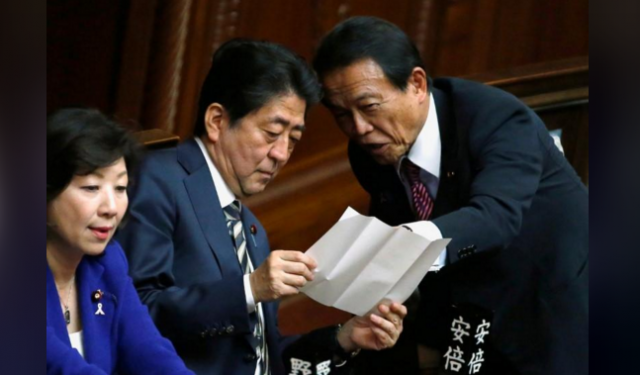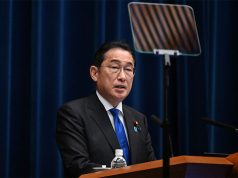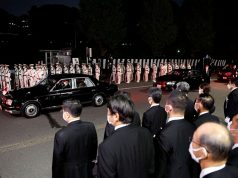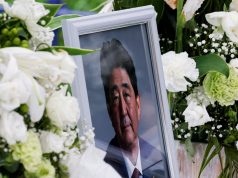
TOKYO – References to Japanese Prime Minister Shinzo Abe, his wife and Finance Minister Taro Aso were removed from documents related to a suspected cronyism scandal, according to the documents seen by Reuters, as concerns grew about a possible cover-up.
Questions over the sale of state-owned land at a huge discount to a school operator with ties to Abe’s wife, Akie, have dogged Abe since the matter became public last year.
Abe, now in his sixth year in office, has denied he or his wife did favors for the school operator Moritomo Gakuen and has said he would resign if evidence were found that they had.
Suspicions of a cover-up could slash Abe’s ratings and dash his hopes of a third term as leader of his Liberal Democratic Party (LDP). Victory in the LDP September leadership vote would put him on track to become Japan’s longest-serving premier.
Aso told a news conference on Monday that several officials at his ministry’s division in charge of the sale were involved in altering the documents to make them conform with testimony in parliament by the then-head of the division.
Opposition parties have called for Aso, who doubles as deputy premier and is key to Abe’s re-election hopes, to resign.
The 77-year-old Aso apologized for his ministry’s actions but said he had no intention to resign. “It’s extremely regrettable and I apologize for this,” Aso told reporters, when asked whether he felt responsible.
Opposition Constitutional Democratic Party of Japan leader Yukio Edano said key questions remained. “We have to question everything thoroughly and strictly – what was the reason, who ordered it?,” Edano told reporters. “What about the multiple explanations in parliament – did they diverge from the truth?”
The risk now for Aso and Abe, experts said, is that the suspected cover-up does more damage than the land sale itself.
“The cover-up is now a bigger issue than the original incident,” said Koichi Nakano, a professor at Sophia University.
A finance ministry official said that 14 items had been altered in the documents after February — when the scandal broke – at the instruction of the ministry’s finance division to match testimony in parliament.
ASO’S SURVIVAL?
One such reference was to Akie’s visit to the school at the heart of the suspected scandal. Also removed was a reference to ties by Abe and Aso to a conservative lobby group, Nippon Kaigi.
A kindergarten run by Moritomo Gakuen taught a nationalist curriculum in line with views espoused by Nippon Kaigi.
Aso’s backing is vital to Abe’s bid for a third term and a key factor in the stability of his administration.
“At the very least, it seems that Aso’s chances of surviving as finance minister are diminishing rapidly,” wrote Tobias Harris, vice president of consultancy Teneo Intelligence, in an email. He said there was no “smoking gun” showing direct intervention by Abe or his wife.
But Harris added: “It now seems to be more a question of whether Abe can manage an orderly exit at the end of his term in September or whether he’ll resign hastily again – but I don’t see how he can win a new mandate amidst the Abe fatigue that will surely grow after these revelations.”
On Friday, National Tax Agency chief Nobuhisa Sagawa abruptly resigned over his remarks in parliament about the case.
Sagawa headed the ministry division that submitted the documents before he was tapped as tax agency chief in July, an appointment critics saw as a reward for his efforts to diffuse the issue with his statements to parliament last year.
Some LDP members said the saga could undermine the party.
“It is inconceivable that the bureaucrats on the spot had such authority (to alter the documents),” media quoted Shigeru Ishiba, an LDP lawmaker who has made no secret of his desire to challenge Abe in the party race, as saying on the weekend. “If we don’t make clear who did this, trust in the LDP will waver.”
Abe, 63, swept back to power in December 2012 promising to revive the economy and bolster Japan’s defense. It was a rare comeback for the conservative lawmaker, who quit abruptly in 2007 after a year in office marked by scandals in his cabinet, a deadlocked parliament and ill health.
His ruling bloc won a two-thirds “super majority” in an October lower house poll, helped by opposition disarray.
A March 9-11 survey by the Yomiuri newspaper showed support for Abe’s cabinet has now fallen to 48 percent, down six points from a month earlier. Non-support rose to 42 percent and 80 percent said that the matter had not been handled appropriately.








